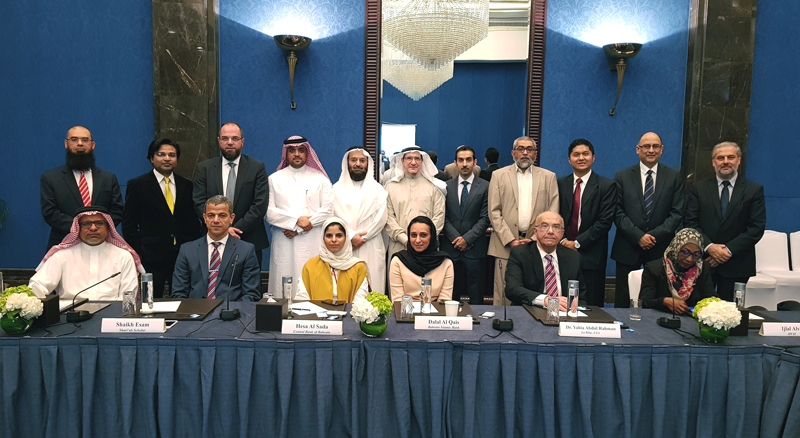
Manama, Bahrain – 20 May 2019 – “The world of Islamic finance should establish its own profit rate benchmark and move away from using conventional interest rate benchmarks, despite serious challenges in design, implementation and monitoring of the new benchmark.” This was the conclusion of the 12th Roundtable Discussion organized by the Waqf Fund on the topic “Creating an Islamic Profit Rate Benchmark – Why and How”. 20 people participated in the Roundtable including several from outside Bahrain. Bank Negara Malaysia and Central Bank of Sudan were among the regulators – besides the Central Bank of Bahrain – whose representatives were present at the event. Industry practitioners, academics and Shari’ah scholars also attended the Roundtable. The leadership of standard setting bodies AAOIFI and IIFM was also represented together with senior people from International Shari’ah Research Academy (ISRA), Malaysia and Islamic Research & Training Institute (IRTI), Saudi Arabia.
The Roundtable started with four presentations from Omar Mustafa Ansari, Acting Secretary General, AAOIFI, Dr. Yahia Abdulrahman, founder of La Riba Bank, USA, Dr. Younes Soualhi, senior researcher, ISRA and Dr. Sami Al Suwailem, CEO, IRTI. The speakers deliberated on various aspects of the need to create a new Islamic profit rate benchmark, the issues with using LIBOR, the developments regarding LIBOR’s replacement and the practical issues in implementing a new benchmark. After the presentations the floor was opened for debate and discussion. The participants raised various questions and concerns on the design and implementation of the new benchmark. Some of the key points discussed during the Roundtable are mentioned below.
- Although scholars have allowed the use of conventional benchmarks for pricing, it is not an ideal state.
- Would a new benchmark be used by the most important stakeholder – the customer – if it is significantly higher than the conventional benchmark rate?
- Another perspective on the customer is that while it is generally perceived that most customers would not consider the Islamic option over conventional if the rate differential is significant, we should keep in mind that there is a large segment of potential customers who do not come to Islamic banks because they do not consider LIBOR permissible.
- The design of the Islamic profit rate benchmark should consider the time value of money as well as the time value of economic resources, using rate of return in real economic sectors.
- There may not be a single Islamic profit rate benchmark but several, depending on the underlying economic reality of the transaction.
- There will likely be serious implementation challenges given that the Islamic finance market is still small in most jurisdictions and not in a position to dominate the financial markets.
- The use of Fed Funds rate as benchmark can be considered as it is not an interest rate but comprises of economic growth forecast and inflation expectations.
- Famous economist John Maynard Keynes stated that the interest rate on money is different from the interest rate on a commodity, thereby accepting that an economy may not have one but several rates of interest / return.
- Governance is not the only thing wrong with LIBOR. The other issue is that LIBOR represents the money market rate (or opportunity cost for the banks) which may not be appropriate to be used by everyone in the economy and in all cases.
- Date reliability is a big issue in most Islamic finance markets. Surveys of consumers (retail and corporate) are an excellent way to gauge future economic growth and inflation expectations.
- To create an Islamic profit rate benchmark we should follow a three pronged strategy:
- Benchmark formula – to be setup by economists, taking view of the practitioners
- Governance (of the mechanism) – to be done by the infrastructure bodies like AAOIFI and IIFM
- Implementation and monitoring mechanism – to be done by the regulators
- An Islamic profit rate benchmark, once created, can be tested for a few years by way of simulation to determine whether it performs better or worse than LIBOR and LIBOR equivalents.
The Chairman of the Waqf Fund Mr. Khalid Hamad thanked the presenters and the participants of the Roundtable, especially those who travelled from outside Bahrain. He stated that the Waqf Fund will conduct further study involving various stakeholders in order to progress to the next level. Despite the complexity of the topic he insisted that the Islamic finance industry must make an effort to create its own benchmark.
